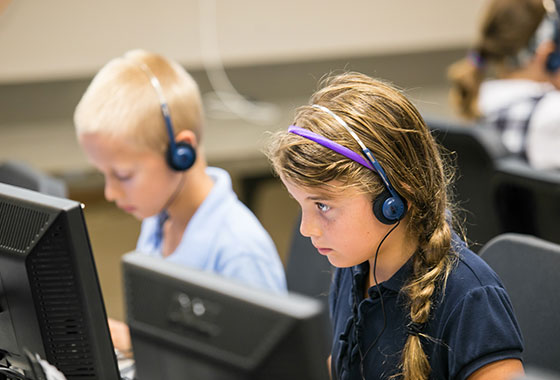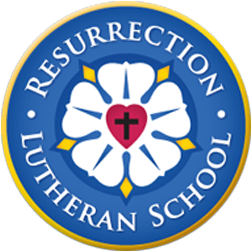
Overview
Resurrection Lutheran School provides a learning environment that is academically rich for students in grades junior kindergarten through Grade 8. Each day, students experience a very special kind of learning atmosphere that has continued to strengthen and grow since RLS opened in 2002. At RLS the teachers, administration, church staff and parents work together to plant seeds in the hearts and minds of our students through discipline, respect, guidance, encouragement, sound educational strategies and daily modeling of Christian love.
At RLS, we follow the North Carolina State Standards as a baseline while integrating national standards and extension activities. We place a high value on writing with a focus on both composition and intellectual depth. Our goal is to provide a rigorous core curriculum in the Lutheran tradition emphasizing the holistic development of the student (academic, social, emotional, physical, and spiritual). Students are prepared for “honors level” coursework in high school. While some RLS students choose a parochial high school, the majority of our students will matriculate into their local public high school.
Field trips, cultural arts programs, community service, differentiated classroom instruction, hands-on learning, collaboration, special activities, and a variety of extracurricular opportunities all contribute to a solid foundation in the elementary grades. In middle school, RLS provides for unique overnight travel opportunities, academic competitions, clubs, athletic teams, chorus, band, drama, and various leadership opportunities.
Junior Kindergarten
In Junior Kindergarten, our focus is to instill a positive attitude toward learning, creating a foundation for a lifelong love of education and exploration. Through weekly unit themes rooted in a Biblical worldview, students will engage with diverse subjects and topics to gain insights about the world.
*Students must be 4 by August 31 to enroll in full-day junior kindergarten (Pre-k).

Kindergarten
The kindergarten classroom has a dedicated full-time teacher and teaching assistant to ensure that children transition smoothly into elementary school. Students are encouraged to take responsibility for their own learning and taught to explore strategies as they work toward independence using the “fruits of the spirit (love, joy, peace, patience, kindness, goodness, faithfulness, gentleness and self-control)” as a model for Christian life. The classroom environment is loving, predictable, and FUN as students develop foundational academic skills that will prepare them for first grade and. *Students must be 5 by August 31 to apply to kindergarten.
first Grade
Students and parents will find that creativity is integral to first grade. With an emphasis on writing and reading skills, first grade combines art and technology with academics. Our math curriculum covers many concepts, including problem-solving with addition and subtraction, fractions, time, and place value. We emphasize using kindness and promoting respect and responsibility. Students will grow academically and spiritually as they explore the world God has created and their relationship to it.
Second Grade
In second grade, we learn together through creativity, collaboration, communication, and critical thinking. We make it our mission to love and learn about our class family as we work hard together. A few of the highlights of second grade include celebrating Wonka-mania Day, Free Enterprise Day, Friendship Week, hatching chicks, and watching a variety of organisms as they go through the life cycle. It’s quite an exciting journey!
Third through Fifth Grade
Math – Pearson enVision Math 2.0 is based on conceptual understanding. The program incorporates grade-level objectives and problem-solving through interactive and visual learning. While the program is organized around the Common Core domains, RLS teachers modify the curriculum to meet the newly revised North Carolina math objectives.
Language Arts – Foundational learning of grammar and composition is taught through Shurley English instruction. Students spirally learn sentence structure, conventions, various parts of speech, sentence identification, the writing process, and traits of writing. Teachers correlate writing units with cross-curricular studies, such as Literature and Social Studies. Writing units include descriptive essays, research reports, persuasive essays, narrative writing, instructional writing, and writing poetry.
Literature – In the intermediate grades, reading moves from a phonetically based program to a literature-based program that focuses on fluency, vocabulary, and reading comprehension. Novels are often selected because of their cross-curricular support.
Non-fiction text covers 50% of the literacy objectives at the 3-5 level. Third grade primarily uses the Curriculum Associates Cars and Stars program, and 4th and 5th grade uses close reading text passages, articles, and activities. Story Works
Grades 3-5 also use various supplemental and teacher-created activities to enrich each child and make instruction student-driven and meaningful to each child. Grade 3 students learn Zaner-Bloser cursive handwriting.
Science – The 3-5 Science curriculum focuses on weather, space, plant life, the human body, rocks and minerals, electricity and magnetism, force and motion, and animal studies. Teachers use several different Fossil and Delta Education Kits and texts for experimental instruction.
Social Studies is intertwined throughout cross-curricular units at RLS as well as through various texts and publishers. The focus is the United States and North Carolina. Many hands-on projects and field trips enrich and enhance the fascinating things learned through these benchmarks.
Religion – One in Christ Workbook Series, Concordia Publishing House. Through stories and activities, students grow in faith and Christian living
Middle School (6-8)
Math
In middle school, we will focus on building problem-solving skills and strategies using the North Carolina standard course of study. At all levels, we will study ratio and proportional relationships, the number system, expressions, and equations, geometry, statistics and probability. As students move into higher levels of math, they will study linear functions, and those taking Math 1 will also dive into nonlinear functions.
Course options: Placements made according to ability. Standard level 6th, 7th & 8th Grade Math, Compacted 7th & 8th Grade & Math 1 (High School Credit).
Language Arts
The North Carolina State Standards and Common Core Objectives define what skills students should master by the end of each grade level. The language arts curriculum will include a variety of informational texts that will increase in complexity. Students will utilize workbooks and mentor sentences to practice language standards related to the grammar continuum. The writing strand will include arguments, informative texts, narratives, and conducting short research projects. These skills are practiced in every subject area, with numerous opportunities to experience enriching collaboration. Informational reading, research, and writing will align with the material covered in Science, Social Studies, and Math.
Literature Studies
The separation of Language Arts and Literature Studies allows students to interact with nonfiction more deeply. The Reading Standards for Literature will be covered by studying novels, poetry, short stories, and drama. Students will analyze texts to cite textual evidence, determine unknown vocabulary, integrate ideas, and examine craft and structure. Students will participate in independent novel reading supported by all teachers across the curriculum. Class discussions, personal journaling, and project-based assessments will push students to activate prior knowledge while at the same time formulating real-world applications.
Science
Physical Science, Cycles of Matter, Energy Transfer, Motion and Force, Biological Science, The Human Body, Cell Theory, Heredity and Genetics, Microbiology, Earth Science, Geological Cycles, The Solar System, Population, Dynamics, Ecology, Atmospheric Studies, The Hydrosphere, Evolution of Landforms and Organism, Beginning Topics in Chemistry, Intro to Scientific Theory and Law, research of influential scientists/theories. Publisher: Glencoe Integrated iScience, McGraw-Hill Education
Social Studies
Advanced Mapping and Geographical Concepts, Geographic, Cultural, Historical, and Sociological Studies of World Regions: Ancient Greece and Rome, Medieval Europe and Renaissance Revolutionary and Modern Europe, Latin America, Australia, Africa, Asia, North America, Comparison and Contrast of Cultural Features. North Carolina and American Political, Historical, and Geographical Study. In-depth Study of Multiple “Eras” in US History, Political Science, Comparative Study of World Political Systems, US Electoral Processes, and Current Events. Publisher: Discovering World Geography, McGraw-Hill Education
Religion
Comparative Study of World Religions, Survey of Old Testament, Survey of New Testament, Application of Biblical Concepts to Daily Life, Servant, Leadership/Service Opportunities, Hymns/Songs of Faith, Chapel Leadership, Memory Verses. Publisher: Concordia Publishing House
Middle School Electives
Middle School Electives focus on Fine Arts – Drama, Band, Choir, and Art. Other electives offered include Study Skills, STEM, Chapel Leaders, Yearbook, Advanced Topics in Art, and Personal Finance. In middle school, students will be able to choose and participate in two electives every quarter, allowing them to explore a variety of interests throughout the school year. Over the course of the year, a total of eight electives can be taken. In addition to the elective choices, all students must fulfill their Fine Arts requirement by completing courses in Art, Choir, Band, and Drama as 4 of the eight elective choices. 6th Graders will take a Study Skills elective during the first quarter to prepare them for the best success in middle school.
Chapel
One day a week, students will attend chapel in the sanctuary of Resurrection Lutheran Church. They will enjoy weekly Bible lessons and learn traditional hymns from our dedicated church leaders. Parents are encouraged to attend this chapel service; from time to time, the students will be participating in the leading of chapel.
Technology
Resurrection Lutheran School is committed to embracing technology at every grade level. The technology lab is complete with 25 workstations, printers and state of the art software. Computers, Chromebooks, iPads, TI calculators, Smart Boards, Smart Response, and projectors are all used in the classroom in order to promote interactive learning. RLS teachers are instrumental in bringing this technology to life as they embrace the new concepts and commit themselves to integrating technology in their classrooms daily.


